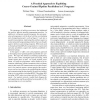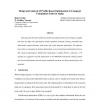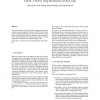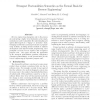70 search results - page 5 / 14 » Restructuring Legacy C Code into C |
141
Voted
MICRO
2007
IEEE
15 years 8 months ago
2007
IEEE
The emergence of multicore processors has heightened the need for effective parallel programming practices. In addition to writing new parallel programs, the next generation of pr...
101
click to vote
JILP
2000
15 years 2 months ago
2000
This paper describes and evaluates the profile-based optimizations in the Compaq C compiler tool chain for Alpha. The optimizations include superblock formation, inlining, command...
108
Voted
SIGSOFT
1994
ACM
15 years 6 months ago
1994
ACM
This paper describes LCLint, an efficient and flexible tool that accepts as input programs (written in ANSI C) and various levels of formal specification. Using this information, ...
121
Voted
CASCON
1996
15 years 3 months ago
1996
A large portion of the software used in industry today is legacy software. Legacy systems often evolve into dicult to maintain systems whose original design has been lost or else ...
139
Voted
WCRE
1995
IEEE
15 years 5 months ago
1995
IEEE
Reverse engineering of program code is the process of constructing a higher level abstraction of an implementation in order to facilitate the understanding of a system that may be...




